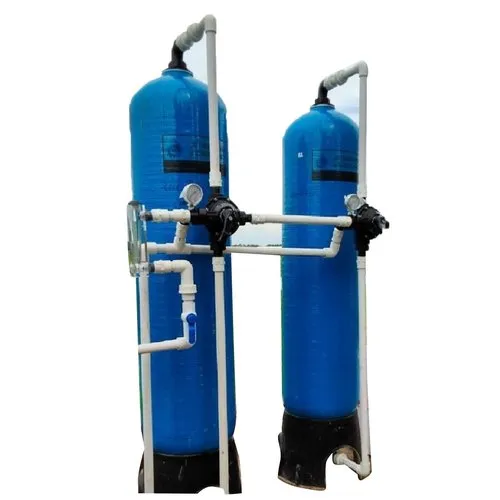
Our Product
SS SOFTNER PLANT
An SS Softener Plant (Stainless Steel Softener Plant) is a water treatment system designed to soften hard water by removing calcium (Ca²âº) and magnesium (Mg²âº) ions, which cause water hardness. These ions are replaced with sodium (Naâº) ions through a process known as ion exchange. The use of stainless steel in the construction of the softener plant ensures a high level of durability, resistance to corrosion, and a longer service life compared to other materials. SS Softener Plants are widely used in industrial, commercial, and domestic applications where water quality is critical.
Key Components of an SS Softener Plant:
-
SS Vessel (Stainless Steel Tank): The primary structure of the softener is made of stainless steel, which provides strength, resistance to corrosion, and longevity. The SS vessel houses the ion-exchange resin beads, which are the core component responsible for softening the water.
-
Ion Exchange Resin: The resin beads are the heart of the softening process. As hard water flows through the resin bed, calcium and magnesium ions are exchanged for sodium ions, thus softening the water.
-
Control Valve: The control valve manages the flow of water through the system, ensuring that water passes through the resin in the correct manner. It also manages the regeneration process by directing the brine solution to the resin bed.
-
Brine Tank: This tank holds the salt solution (usually sodium chloride) used for regenerating the resin. After the resin has been exhausted of sodium ions, the brine tank is used to flush out the accumulated hardness ions, restoring the resin’s softening capacity.
-
Regeneration System: Regeneration is a key function of the softener plant. After the resin is saturated with hardness ions, it is regenerated using a salt solution from the brine tank. This cycle helps restore the resin’s ability to soften water.
-
Flow Meters and Pressure Gauges: These components are essential for monitoring water flow and pressure within the system, ensuring that the softener is functioning efficiently and effectively.
-
Discharge Valve: Once the water is softened, it exits through the discharge valve and is directed to the desired location for use.
Working Principle:
- Water Inlet: Hard water enters the SS softener plant, flowing into the SS vessel that contains ion-exchange resin.
- Ion Exchange: As the water flows through the resin, calcium and magnesium ions in the water are exchanged for sodium ions from the resin. This process removes hardness from the water, making it soft.
- Regeneration: Once the resin is saturated with hardness ions, the plant switches to a regeneration cycle. The brine solution from the brine tank is passed through the resin, displacing the hardness ions and replenishing the resin with sodium ions.
- Softened Water Output: After the ion exchange process, the softened water flows out of the vessel, ready for use.
Applications of SS Softener Plants:
- Boiler Feed Water Treatment: Softened water prevents scaling inside boilers, improving efficiency and reducing maintenance costs.
- Cooling Towers: Softened water helps prevent scale build-up in cooling towers, extending their lifespan and improving heat transfer.
- Food and Beverage Industry: Softened water is used in production processes where water quality is crucial, such as in beverages, dairy products, and other food processing.
- Textile Industry: Water softeners are important in textile industries for dyeing, washing, and finishing processes, ensuring better quality output.
- Pharmaceutical Industry: Ensuring the water used in pharmaceutical processes is free of hardness is essential for product consistency and purity.
- Automotive and Machinery Industries: Softened water is used for cleaning and washing parts, avoiding mineral deposits that could affect machine performance.
Advantages of SS Softener Plants:
- Corrosion Resistance: Stainless steel is highly resistant to corrosion, making SS softener plants ideal for use in harsh industrial environments where traditional materials might degrade.
- Durability: The use of stainless steel ensures a longer lifespan, reducing the need for frequent replacements and repairs.
- High Strength: Stainless steel provides a sturdy construction, allowing the plant to handle high-pressure environments.
- Hygienic: SS softener plants are easy to clean and maintain, making them ideal for applications in industries such as food, beverage, and pharmaceuticals.
- Compact and Efficient: These plants are typically compact in design, offering efficient space utilization and consistent performance.
Maintenance of SS Softener Plants:
- Routine Monitoring: Regularly check the system’s pressure, flow rate, and salt levels to ensure proper functioning.
- Resin Cleaning and Regeneration: Over time, the resin may need to be cleaned or regenerated to maintain efficiency. This involves using a brine solution to remove hardness ions accumulated in the resin.
- Brine Tank Management: Ensure that the brine tank has sufficient salt to perform effective regeneration cycles.
- Replacement of Resin: Depending on usage, the ion-exchange resin may need to be replaced periodically.
Conclusion:
An SS Softener Plant is an essential water treatment system for industries that require soft water to prevent scaling, improve equipment lifespan, and ensure process efficiency. The use of stainless steel ensures that the system is durable, corrosion-resistant, and reliable. With its robust construction and efficient operation, an SS Softener Plant is a valuable investment for maintaining high water quality in various industrial and commercial applications.

